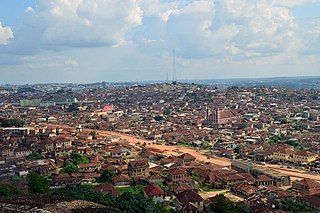
Ogun State is a state in southwestern Nigeria. As a Nigerian state, Ogun is the second most industrialised state after Lagos, with a focus on metal processing. It has good road and rail connections to the harbours in Lagos and Lekki. Wole Soyinka, winner of the Nobel Prize for Literature 1986, lives in Ogun.
The Ẹgbado, now Yewa, are a subgroup of the Yoruba people and inhabit the eastern area of Ogun West Senatorial District, Ogun State, in south-west Nigeria, Africa. In 1995 they changed their name to the Yewa which comes from the Yewa River which in turn comes from the Yoruba goddess Yewa. Yewa occupy four Local Government Areas, Yewa South, Yewa North, Imeko-Afon, and Ipokia, while the Ado-Odo/Ota LGA forms the fifth Awori part of the senatorial district.
The Egba people are a subgroup of the Yoruba people, an ethnic group of western Nigeria, a majority of whom are from the central part of Ogun State that is Ogun Central Senatorial District.
Oba means "ruler" in the Yoruba and Bini languages. Kings in Yorubaland, a region which is in the modern republics of Benin, Nigeria and Togo, make use of it as a pre-nominal honorific. Examples of Yoruba bearers include Oba Ogunwusi of Ile-Ife, Oba Aladelusi of Akure, and Oba Akiolu of Lagos. An example of a Bini bearer is Oba Ewuare II of Benin.

Abeokuta is the capital city of Ogun State in southwest Nigeria. It is situated on the east bank of the Ogun River, near a group of rocky outcrops in a wooded savanna; 77 kilometres (48 mi) north of Lagos by railway, or 130 kilometres (81 mi) by water. As of 2006, Abeokuta and the surrounding area had a population of 449,088.
Ado-Odo is the metropolitan headquarters of the ancient kingdom of Ado, renowned for its Oduduwa/Obatala temple, the ancient fortress of the traditional practice of Ifá. Oodu'a is also regarded by traditionalists as the mother of all deities, world over. All of these made Ado an inviolate territory in western Yorubaland—the same "father-figure" status accorded to Ile-Ife. Unlike the other kingdoms, which had at one time or the other engaged in the internecine wars that ravaged Yorubaland in the nineteenth century, Ado stood out as an unconquered sanctuary city-state throughout the period.
The Owu sub-ethnicity is a part of the Yoruba people of West Africa. Ago-Owu in Abeokuta is where the Owus are mostly concentrated, however large Owu settlements are found throughout Yorubaland. The Yoruba confederacy of kingdoms extends beyond the boundaries of Nigeria into the Republic of Benin and Togo.
Egba Ake, otherwise known as Egba Alake, is one of the four sections of Egbaland, the others being Oke-Ona, Gbagura, and the Owu.

Adedotun Aremu Gbadebo III is the current Alake of Egba, a clan in Abeokuta, Nigeria. He has ruled since 2 August 2005.

The Alake of Egbaland is the paramount Yoruba king of the Egba, a clan in Abeokuta, Ogun State, southwestern Nigeria. Egba consists of Egba Ake, Owu kingdom, Oke-Ona and Egba Gbagura.
Josiah Jesse "J.J." Ransome-Kuti was a Nigerian clergyman and music composer. He was known for setting Christian hymns to indigenous music, and for writing Christian hymns in Yoruba.
Eso Ikoyi is an aristocratic attribute amongst the Yoruba people which denotes an eminent warrior. It has been used as everything from a chieftaincy title to a part of praise poetry.

Oba Sir Ladapo Samuel Ademola KBE, CMG (1872–1962), also known as Ademola II, was the Alake of Abeokuta from 1920 to 1962. Before he was crowned Alake, Ademola was involved in the affairs of the Egba United Government. As a member of the Egba council, he was a leading participant in negotiations with the Lagos State colonial government in 1889 for the rights to construct railway tracks passing through Egbaland. In 1904 he travelled with Alake Gbadebo to the U.K., where they were received by King Edward VII. He succeeded Oba Gbadebo in 1920 with overwhelming votes from the Egba council.
The Ibarapa are a Yoruba people group located in the Southwestern corner of Oyo State. The name of the group is derived from a local cultivar of the melon plant, known locally as Egusi Ibara, which was historically acknowledged by neighboring peoples such as the Egbas, Ibadans and Oyos to be extensively cultivated in the area.
Iju also known as Iju Oloko [idʒou ɔ:lɔkɔ], is a Nigerian town located in southern Ogun state and about 18 kilometers from Lagos state, a major commercial hub in West Africa. The town is inhabited mostly by Owu and Egba natives whose ancestors settled there between 1842 and 1845.
Samuel Adesina Gbadebo, otherwise known as Gbadebo II, was a Nigerian traditional monarch who held the title of Alake of Egbaland. Prior to becoming Alake, Gbadebo organized agricultural shows in the Western region of Nigeria.
Wasinmi or Wasimi is an Egba town located on the Lagos-Abeokuta Expressway in Ewekoro local government of Ogun State. It is a few miles from Abeokuta. It is home to one of the oldest churches in the area, St. Michael's Anglican Church, and home to Odegbami International College and Sports Academy.
Adegboyega Edun was an Egba official. He served as the secretary of the Egba United Government, a colonial-era Yoruba political entity.
Okukenu Sagbua was a Yoruba Egba chief. He was a founding member of the Ogboni of Egbaland, and also served as the first Alake of Egbaland.
Orile Ijaye is a small town located in Akinyele local government, Oyo state, Nigeria. It is about 18 miles from Ibadan, Oyo state capital. This town was re-inhabited in 1895, 32 years after it was destroyed due to an intra-ethnic and supremacy war with Ibadan; another military power at that time. In 1895, they named it Orile Ijaye from the original name, Ijaye.




